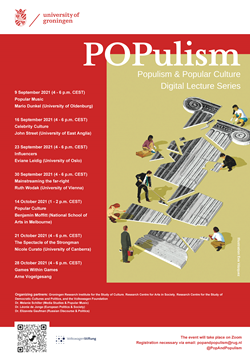Pop and Populism - RUTH WODAK (University of Vienna): "Analyzing the Shameless Normalization of ‘Message Control’ – the Austrian Case"
| When: | Th 30-09-2021 16:00 - 18:00 |
| Where: | Online |
POPulism: Popular Culture and Populism is an interdisciplinary online lecture series that brings together leading international scholars and practitioners from different disciplinary backgrounds to give insights into the various forms of interactions between populism, the radical right, and popular culture.
Populism builds on a worldview based on the antagonistic opposition of ‘the good people' and the ‘corrupt elite’, and is often connected to ideologies such as nativism, misogyny, authoritarianism, and racism. In their attempt to redefine cultural hegemony, populists make use of cultural strategies; leaders, parties and movements often explicitly draw on popular cultural means to disseminate their ideologies, for instance, by using social media, internet memes, and computer games.
From popular music, performance, and celebrity politics, to normalization, online recruitment, and mobilization, the speakers of POPulism explore the relationship between culture and populism, unpacking how it can both promote and challenge populist and radical right discourses.
Abstract
Many context-dependent socio-political, economic, cultural, and historical factors, apart from the performance of allegedly charismatic leaders, lead to the rise of the populist far-right, supported by conservative mainstream parties and the manipulative use of (social) media (Wodak 2021).
Formerly taboo subjects and expressions in mainstream discourse are being accepted more and more (‘normalization’) and have become part and parcel of mainstream politics and the culturalization of exclusion. Such normalization goes hand in hand with a certain ‘shamelessness’: the limits of the sayable are shifting regarding both the frequency of lies and the violating of discourse and politeness conventions – as well as regarding repeated attacks on salient democratic institutions, for example of freedom of the press, independence of justice, and so forth.
Discursive strategies of provocation, blame avoidance, denial, Manichean division, victim-perpetrator reversal as well as eristic argumentation and conspiracy theories dominate official communication, accompanied by ever more nativist nationalism and the racialization of space. As will be illustrated, such strategies have also penetrated pop-culture and symbolic politics.
About the speaker
Ruth Wodak is Emerita Distinguished Professor of Discourse Studies at Lancaster University, UK, and affiliated to the University of Vienna. Over the course of her career, she has been awarded numerous prestigious prizes, including the Grand Decoration of Honour in Silver for Services to the Republic of Austria as well as the Lebenswerk Preis for her lifetime achievements from the Austrian Ministry for Women’s Affairs. Professor Wodak is a member of the British Academy of Social Sciences and the Academia Europae.
She also serves on the boards or editorial teams of a range of distinguished academic journals, including Discourse and Society, Critical Discourse Studies, and Language and Politics. In the past, she has held visiting professorships at various universities, including Uppsala, Stanford, Georgetown, and many others.
Currently, she is a senior visiting fellow at the Institute for Human Sciences, Vienna (IWM). Her research interests span a broad range of topics, such as discourse studies, gender and identity politics, and political communication and populism.
She has published 10 monographs, 29 co-authored monographs, over 60 edited volumes and special issues of journals, and more than 420 peer reviewed journal papers and book chapters. Her most recent book is The Politics of Fear: The shameless normalization of far-right populist discourses, which was published with SAGE in 2021. For further information, visit Ruth Wodak's profile at Lancaster University.
Registration
Registration is required. After registration, you will receive the Zoom link via email.

